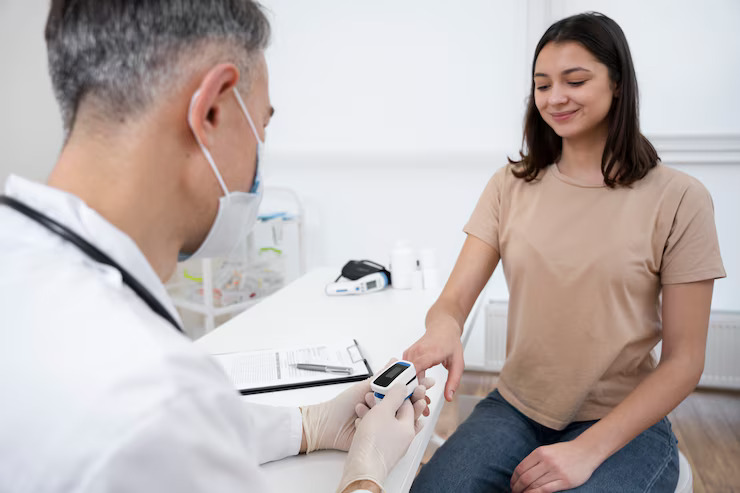
Thu, May 15, 2025 2:12 PM
We live in a fast-paced world where it's easy to put off checkups and ignore those small signs your body might be giving you. But here’s the truth: regular health screenings are not just routine—they’re life-saving.
Many serious health conditions develop quietly and without warning. By the time symptoms show up, treatment options may be limited. That’s where screenings come in—they help catch problems early, sometimes even before they become problems at all.
Why Screenings Matter More Than You Think
Preventive screenings are your body’s early warning system. They help detect:
-
Heart disease
-
Diabetes
-
High blood pressure
-
High cholesterol
-
Cancer (breast, colon, prostate, and more)
-
Osteoporosis
The sooner a condition is identified, the sooner treatment can start—often with better outcomes and fewer complications.
The Science Behind Screenings
Regular screenings use measurable health data, also known as vital measurements, to spot irregularities. These might include:
-
Blood pressure
-
Glucose levels
-
Cholesterol
-
BMI (Body Mass Index)
-
Heart rate
Understanding your vital measurements is the first step toward a healthier you. These stats tell doctors how your body is functioning and help pinpoint risk factors early.
How Often Should You Get Screened?
It depends on your age, gender, family history, and current health condition. Here’s a basic guideline:
-
Annually: Blood pressure, cholesterol, glucose, BMI
-
Every 1-2 years: Mammograms (women over 40), prostate exams (men over 50), skin checks
-
Every 5-10 years: Colonoscopy (after age 45)
Talk to your provider to personalize your schedule based on your unique health profile.
Real Talk: Early Detection Saves Lives
Let’s break it down with a few examples:
-
Breast Cancer: When found early, the 5-year survival rate is 99%.
-
Colon Cancer: Can be detected and prevented by removing pre-cancerous polyps.
-
Diabetes: Managing blood sugar early prevents long-term damage to organs.
These numbers are proof that screenings don’t just extend life—they improve its quality.
Total Health: The Whole-Person Approach
Health isn't just about avoiding illness—it’s about feeling your best physically, mentally, and emotionally. Total health screenings give you a full picture of your well-being, covering:
-
Cardiovascular health
-
Mental health indicators
-
Lifestyle and behavioral factors
-
Family history risk assessments
This all-in-one evaluation helps you make informed decisions about your lifestyle and medical care.
The Rise of Telehealth: No More Excuses
We get it—life is busy. That’s why telehealth has become a game-changer in preventive care. You can now get expert medical advice, follow-ups, and even screenings without leaving your home.
With telehealth services, you can:
-
Schedule virtual appointments
-
Get screening recommendations
-
Discuss test results with a healthcare provider
-
Monitor chronic conditions remotely
Convenient, fast, and just as effective—telehealth removes the barriers of time and travel.
Affordable Screenings: Don’t Let Cost Be a Barrier
Worried about expenses? You’re not alone. But here’s the good news: many health plans cover preventive screenings 100%. And if you're paying out-of-pocket, services like prescription benefit programs can help lower costs for medications and treatments that follow screenings.
What to Expect During a Screening Appointment
If you’ve never had a full screening before, here’s what a typical session might include:
-
Check-in and medical history review
-
Blood pressure, heart rate, and oxygen levels
-
Blood draw for glucose and cholesterol
-
BMI and weight check
-
Specialist consultations (if needed)
-
Discussion of results and next steps
Screenings are quick, usually painless, and could be the most important appointment you make this year.
Common Myths About Screenings—Busted
Let’s clear up some misconceptions:
-
"I feel fine, so I don’t need one."
Many conditions have no symptoms early on. -
"I’m too young."
Illnesses like high blood pressure and diabetes are showing up in younger people every year. -
"It’s too expensive."
Most insurance plans cover screenings at no cost. Plus, there are community health programs and telehealth options available.
Top Tips to Stay on Track with Screenings
-
Set reminders on your calendar.
-
Use telehealth for scheduling and follow-ups.
-
Make screenings part of your yearly routine, like a dental or eye exam.
-
Talk to your family about their health history.
-
Track your vital signs with mobile health devices or apps.
Conclusion: Your Life Could Depend on It
Regular health screenings may seem like a small task, but their impact is massive. They give you the power to catch issues early, avoid serious complications, and stay in control of your health journey.
Don’t wait for a symptom to show up. Prevention truly is better than cure—and it all starts with one simple appointment.